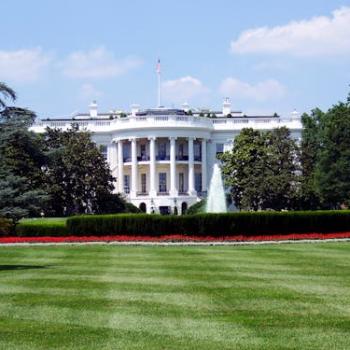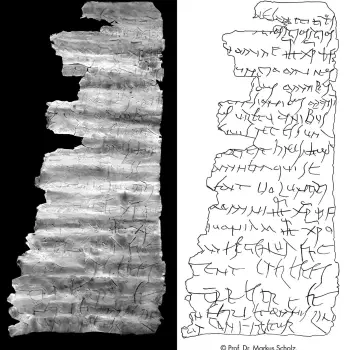I live in the Phoenix Valley in Arizona. Today, the Roman Catholic Church declared that thousands of baptisms performed by a single priest at the St. Gregory Catholic Church in the Diocese of Phoenix are void because Friar Andres Arango, ordained 25 years ago, always innocently pronounced the Catholic formula for baptism by using the word “we” instead of “I.” As reported in USA TODAY, he used the formula (in English), “we baptize you in the name of the father and of the son and of the Holy Spirit” instead of the correct phrase “I baptize you in the name of the father and of the son and of the Holy Spirit.” Due to this mishap, Father Arango was forced to resign this month.
The Diocese explained, “it is not the community that baptizes a person and incorporates them [sic] into the Church of Christ; rather, it is Christ, and Christ alone, who presides at all sacraments. Therefore, it is Christ who baptizes. If you were baptized using the wrong words, that means your baptism is invalid, and you are not baptized.” The Diocese said the use of this incorrect formula would not only render those so baptized as non-Catholics, but it also could render some marriages invalid.
The theological organ of the Roman Catholic Church is the Congregation of the Doctrine of the Faith. It issued a statement in 2020 that says if baptisms are performed using the plural pronoun “we” instead of the singular pronoun “I,” those baptisms are invalid. Church leaders discovered last month that Father Arango was always uttering “we” instead of “I” when he pronounced the Church’s baptismal formula.
Father Arango was most penitent when he was informed of his error. He said, “I deeply regret my error and how this has affected numerous people in your parish and elsewhere. With the help of the Holy Spirit and in communion with the Diocese of Phoenix, I will dedicate my energy and full time ministry to help remedy this and heal those affected.”
This baptismal formula used by the Roman Catholic Church is based upon the supposed words of the risen Jesus that he uttered to his gathered disciples and recorded at the close of the Gospel of Matthew. It does not appear in any of the other three gospels of the New Testament. It reads in the NRSV, “All authority in heaven and on earth has been given to me. Go therefore and make disciples of all nations, baptizing them in the name of the Father and of the Son and of the Holy Spirit, and teaching them to obey every that I have commanded you. And remember, I am with you always, to the end of the age” (Matthew 28.18-20).
There is some manuscript discrepancy with the clause, “baptizing them in the name of the Father and of the Son and of the Holy Spirit,” thus that portion of this saying of Jesus which the Church uses as its formula. But the Roman Catholic Church is not alone in its practice of using this specific formula, and thus allowing no other formula or words, for baptisms.
There is some evidence that causes me and others to question the authenticity of this phrase in Matthew 28.19.
First, “the name of the Father and of the Son and of the Holy Spirit” appears rather non-sensical, and it does not correspond to anything in the entire New Testament. The name of God, whom Jesus called “the/my Father,” is clearly YHWH, usually translated Yahweh or Yehvah, in the Hebrew Bible (=Old Testament). This name for God occurs about 7,000 times in the Hebrew Bible, and it is usually translated “LORD.” (See especially Exodus 3.13-15.)
Second, the United Pentecostal Church is adamant in asserting that people should be baptized only in “Jesus” name or “Jesus Christ” because that is what we read about four times in the book of Acts in the New Testament (Acts 2.38; 8.16; 10.48; 19.5). Thus, this evidence clearly does not corroborate with Matthew 28.19 if one thinks that is the sole formula, as most churches do. I believe these Pentecostals are correct in their assertion about the legitimacy of baptizing in “Jesus” name. However, I do not agree with them that that baptizing according to the Matthew formula is wrong and therefore those people so baptized had an invalid baptism.
I don’t think God or Jesus cares about the exact words being uttered when people get baptized. They are being baptized into Jesus Christ spiritually speaking, and uttering Jesus’ name is what is important. I have a blog post about this at https://www.patheos.com/blogs/kermitzarleyblog/2017/09/montanists-insert-trinitarian-formula-matthew-2819/.
The Roman Catholic Church voiding baptisms for this reason is, in my opinion, a sorry state of affairs. It is a majoring in minutiae that is not important whatsoever.
It reminds me of the Nicene Council, in 325, which the Catholic Church deems the First Ecumenical Council. Emperor Constantine called together 318 bishops to solve the argument troubling his empire about whether or not Jesus was fully God. The emperor wanted a creed produced, which he got. (The language spoken at the council was Greek, which was the native tongue of much of the eastern portion of the empire.) The creed pronounced that Jesus was “very God of very God.” The argument centered on whether Jesus was homoousios (same substance as God) or homoiousios (like substance), a difference of only the letter i. Centuries later, historian Edward Gibbon, author of The History of the Decline and Fall of the Roman Empire, wrote of this difference, saying, “the profane of every age have derided the furious contests which the difference of a single diphthong excited between the Homoousians and the Homoiousians.”


















